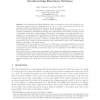53 search results - page 6 / 11 » The RSA Group is Pseudo-Free |
CTRSA
2004
Springer
14 years 3 days ago
2004
Springer
Abstract. Exponentiation is a central process in many public-key cryptosystems such as RSA and DH. This paper introduces the concept of self-randomized exponentiation as an efficie...
EUROCRYPT
2004
Springer
14 years 2 days ago
2004
Springer
We describe a short signature scheme that is strongly existentially unforgeable under an adaptive chosen message attack in the standard security model. Our construction works in g...
CORR
2007
Springer
13 years 6 months ago
2007
Springer
There are several public key establishment protocols as well as complete public key cryptosystems based on allegedly hard problems from combinatorial (semi)group theory known by no...
IACR
2011
12 years 6 months ago
2011
Zero knowledge sets (ZKS) [18] allow a party to commit to a secret set S and then to, non interactively, produce proofs for statements such as x ∈ S or x /∈ S. As recognized in...
ASIACRYPT
2001
Springer
13 years 11 months ago
2001
Springer
The Advanced Encryption Standard (AES) provides three levels of security: 128, 192, and 256 bits. Given a desired level of security for the AES, this paper discusses matching publi...


